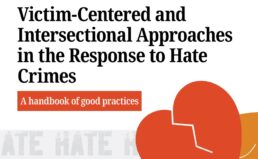Liberal MEPs want to re-open an already adopted European Parliament position on audiovisual services reform, saying that it justifies discrimination of lesbian, gay, bi- and transsexual (LGBT) people.
The overhaul is an update of EU-wide rules on media services and TV advertising.
The problem, according to the liberals, is that the reform sets out to protect the “moral development of a child” by giving government authorities the right to block harmful content on social media.
“This should not be part of audiovisual services regulation,” said Yana Toom, an Estonian liberal and shadow rapporteur on the file.
“I think it’s very dangerous if we – MEPs – start to talk about morals. What does it mean? There is no legal definition of what is moral. If we start taking in those terms, we will have no arguments for people like Viktor Orban, who can excuse any reform with moral concerns,” she said, referring to Hungary’s right-wing leader.
Liberals say the parliament adopted its position without due scrutiny.
Last month, the parliament’s culture and education committee narrowly passed a report by the two German co-rapporteurs, Sabine Verheyen from the centre-right EPP group, and Social Democrat Petra Kammerevert.
Earlier this week, it was announced that the committee file would constitute the parliament’s negotiating position in so-called trilogue talks with the European Commission and Council of the EU.
Moral concerns
The provision on moral concerns could still be removed in those talks.
EUobserver was not able to speak to the two co-rapporteurs.
Another German MEP, Helga Truepel, who followed the file on behalf of the Greens, said she backed the culture committee report, even if she would have liked to delete references to moral harm on minors.
“But it is already in the current directive without creating problems there. Furthermore, there is a clear reference in the same article on the fundamental charter of human rights and and an additional catalogue that there shall not be discrimination for reasons of sex or sexual orientation,” she told EUobserver.
“I think we have a clear formulation in the text to avoid misuse of the article,” she added.
But Sophie in’t Veld, a Dutch liberal MEP and vice-chair of the Alde group, said the parliament was already justifying a Russian-style anti-gay propaganda law in Lithuania.
In 2013, the Baltic state, said to be one of the least tolerant towards homosexuals in Europe, adopted a so-called law on the protection of minors against detrimental effects of public information.
Misused law
The law was quickly misused against information on sexual minorities.
A fairytale featuring a same-sex couple was banned for promoting “harmful, primitive and purposeful propaganda of homosexuality”, while an EU-financed promotional video, which confronted stereotypes about love and family models, was only allowed to be shown after 11 PM, together with alcohol and cigarette ads.
Lithuanian gay rights activists tried to challenge the law at EU level, but their attempts were in vain.
Last December, the commission said it would not launch an infringement procedure against Lithuania, because the country had not broken EU rules on audiovisual services.
In’t Veld said she had hoped the media reform would force Lithuania to change its legislation.
Instead, the contrary has happened – MEPs endorsed the provision and extended it to cover social media.
“It’s all very unfortunate,” the Dutch politician told EUobserver.
“The rapporteurs may be very strong advocates of equal rights, but they don’t seem to realise that they have created a legal tool for discrimination.”
Liberals, with the backing of MEPs from radical-left Gue, the eurosceptic EFDD, and the conservative ECR groups have asked that the parliament’s position is made subject to a plenary vote instead.
That would give MEPs a month to draft amendments and adopt their positions in plenary.
A vote on whether to re-open the file will took place on Thursday by secret ballot.




